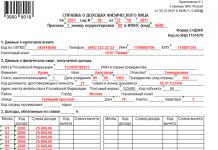The year 2009 can be considered the beginning of mass installations of energy consumption meters. With the adoption of the law of November 23, 2009 No. 261-FZ “On energy saving and increasing energy efficiency“A number of changes were made to legislative acts. Now apartment owners are required to install resource consumption meters: electricity, gas, water in their living quarters.
The Law specifies the deadline for installing water meters - until July 1, 2013 (clause 12 of Article 13), but it is constantly being pushed back. With the entry into force of the document, many owners of residential space began to actively install them. This was facilitated by the active activity of companies offering to carry out work on favorable terms.
However, those who are still in no hurry to acquire a water meter should take into account that the government has introduced penalties for non-compliance with legislative norms. This will be done in the form of a constant significant increase in tariffs, which will force the population to switch to water metering.
When is it necessary to install water meters in 2020 according to the law?
As mentioned earlier, installing water meters is our responsibility by law. Therefore, despite talk about the possible abolition of this norm, it is hardly worth expecting. No one can directly punish residents who do not want to install a meter or do not have the funds to do so. But rising tariffs can hit your pocket hard.
As a result, all that remains is to calculate all the costs for the individual metering devices themselves, their installation and monthly fees and compare them with what awaits residents in apartments without them in 2020. In such housing, the fee for water consumption is calculated by multiplying the standard tariff approved by local authorities by the number of registered people in a given living space.
Every year an additional factor will be applied to the tariff. In 2020, the increasing coefficient for water without a meter remains the same, as in 2019, according to Resolution No. 354 of May 6, 2011 “On the provision of utility services to owners of apartment buildings”, effective from December 27, 2018.
Thus, in 2020, those who have not installed water meters will pay 50% more for consumption, that is, the increasing factor will be 1.5. This puts a significant strain on the family budget.
Among other things, management companies are responsible for the extent to which the Law is complied with in the houses entrusted to them. Their task is to achieve maximum quantity apartments equipped with water meters. Therefore, they are actively working in this direction, sometimes even providing payment in installments for several months.
With the installation of devices, you will lose the headache of a management company insistently demanding to do this, and a significant reduction in water charges, since it will directly depend on actual consumption.
To install a water meter, you must submit an application to the management company. If it does not have permission for this activity, it is obliged to provide a list of organizations providing this service.
Water meters are installed free of charge for owners of municipal housing, For privatized apartments cost may vary in within 4000-7000 rubles.
After installation, it is necessary to invite a representative of the management company, who will draw up a commissioning certificate and put a seal. Sealing is a free service.
When to install water meters in a new building and who should do it?
The installation of individual metering devices (meters) falls within the norms of current legislation. Federal Law No. 261-FZ obliges the use of them, because this will entail significant savings in energy and water resources, and will also allow keeping records of their consumption.
As for new buildings put into operation after the Law came into force, they must definitely be equipped with all the necessary meters: gas, water and electricity. This means that all residential premises must be put into operation with such devices.
Development companies must install water meters in the quantity required for a specific apartment, that is, for each water supply pipe, both cold and hot, as well as a common house meter. Residents must pay attention to this when inspecting the premises and not sign the transfer deed in their absence. If they are not there, then this fact must be reflected in the document or written notification to the developer, who is obliged to correct the situation.
It is worth noting the fact that without water meters, housing being put into operation cannot be accepted by the state commission. This means that the very fact of acceptance by the commission will not allow apartments in the building to be sold and occupied.
Service life of water meters in apartments
The metering device for water consumed by residents is a measuring device and may become insufficiently accurate over time. This distorts the actual numbers by making them smaller or larger.
In order to prevent such discrepancies, . They are:
- For cold water– 6 years,
- For hot water– 4 years.
Special chemical components are added to hot water, which, under the influence high temperature may wear out the device mechanism faster. Therefore, the service life for hot water is slightly shorter.
If the test shows that the measuring tool is in good working order, it can continue to be used until the next test, otherwise it should be replaced. Please note that the average service life of water meters is 12 years.
The homeowner himself is obliged to monitor the end of the inter-inspection period and promptly contact specialized organizations involved in inspection and issuance of the relevant act. You can find out the expiration date of such a period from the meter installation report or the previous verification report. We do not recommend postponing the verification procedure until last days, but take care of this in advance.
The result of meter verification must be provided to the management company without fail. If the deadline passes and the documents are not received, then she has every right to charge for water based on the standards applicable to apartments where metering devices are not installed.
How are water meters checked?
Checking can be done in two ways:
- Without removing the meter. Specialists go to the site and perform water meter tests. As a result, the owner receives a certificate indicating the date and test results. This is convenient for residents - you just need to provide unhindered access to the meter - and requires minimum costs time.
- With the counter removed. Representatives of the company dismantle it, take it to the laboratory and take measurements there. If they find a small problem with the mechanism, they can fix it and install the meter back. In the case where the meter is checked on site, nothing can be corrected. Therefore, the master may offer to remove it and take it for repairs or issue a certificate with a conclusion on replacement.
The easiest way is, of course, the first. It does not require disconnecting the riser to remove the device and wait for reinstallation. This can take from several hours to several days. To avoid any questions regarding the quality of the inspection, immediately check with the company whether it has the appropriate permits for this type of activity.
Verification is a paid service. The cost of checking one meter can be within 1000 rubles.
Video: Is it necessary to install water meters? How do they cheat when installing a meter?
Rules for installing water meters in a private house in 2020
The installation of water meters is subject to a number of rules and regulations. They are almost the same for both residents of apartment buildings and private residential buildings. Therefore, we list what rules must be followed when installing water meters:
- It is necessary to use only devices that have been certified in Russia. Each must be accompanied by a technical passport. The serial number contained in this document must match that printed on the meter body. There is no need to reset the readings on the display, since they will be recorded during sealing and will become the starting point for measuring water consumption.
- A filter must be cut into the pipe up to the installation site of the meter. rough cleaning. This is necessary for the device to last longer. The water coming from the water supply may contain dense particles, leading to rapid wear of the water meter, or more precisely its mechanical parts. The presence of a filter reduces the likelihood of various problems and increases the accuracy of the device.
- The meter must be sealed, otherwise its readings will not be considered valid. They are sealed in an apartment by a representative of the management company, and in a private house - by a water supply organization. The cost of the service is free by law.
- A certain distance must be maintained, which is no more than 20 cm from the entrance to the pipeline to the meter. This is a necessary condition so that the owner cannot independently connect to the meter.
- The meter must be installed in a private house in a room into which a pipe from the central pipeline is led. It should run along the wall. In this case, the air temperature in the room should not be lower than 5 degrees. If the water main is located quite a distance from the house, then you will need to install a meter on the street. In this case, a special well is built where it is placed. Then not only the meter itself is sealed, but also the lid with which the well is closed. Breaking the seal on the lid is allowed only in the event of an accident or fire. The owner of a residential building is responsible for the condition of the pipeline from the location of the water meter to the house itself.
The procedure for commissioning an individual utility meter, that is, accepting it for calculations, is described inDecree of the Government of the Russian Federation dated May 6, 2011 No. 354 . Let's talk about who and how accepts for commercial accounting and seals a new meter, and why it is important to do it correctly.
Who should put the meter into operation and within what time frame?
Since the meter for metering the consumption of a utility resource is under the control of the owner of the premises, it is the owner who is responsible for the installation and proper use, as well as timely replacement of the meter if it fails or its calibration interval has expired (clause 81 of RF PP No. 354).
After installing a new or replacing an old metering device, the procedure for putting it into operation is carried out, that is, documenting it as a calculated one (clause 81 of RF PP No. 354). Work on putting the PU into operation is carried out by the CU contractor. He conducts them without charging any fee in agreement with the owner of the premises or at his request (clause 81 (9) of the RF PP No. 354).
The application must contain the following information:
- information about the owner and his contacts;
- date and time when the owner proposes to put the IPU into operation;
- information about the IPU: a copy of the technical passport, its type and number, installation location, indications at the time of installation and verification date (clause “y”, clause 31, clause 81 of RF PP No. 354).
The meter must be accepted for calculations within a month from the date of its installation (clause “y” of clause 31 of RF PP No. 354). If the CG contractor cannot enter the IPU on the day specified in the application, he must propose a new date and time within three working days. Work cannot be postponed for more than 15 working days from the date of receipt of the application by the Contractor of the Civil Code (clause 81 (1) of the Russian Federation Regulations No. 354).
If, at the agreed time, the contractor did not accept the meter for commercial accounting or the work was postponed for more than 15 working days, then the metering device is considered to be put into operation from the date when the owner submitted the application (clause 81 (2) RF PP No. 354).
What does putting a meter into operation include?
When the time and date are agreed upon, the metering device is installed, the CP contractor carries out the procedure for putting the CP into operation. This process consists of several stages (clause 81 (4) RF PP No. 354):
1. Reconciliation of the CP data with its documentation.
The CP contractor checks the serial number on the meter and in the passport, the equipment and installation diagram - they must match the information in the technical documentation of the CP manufacturer. If the meter is not new, then it is necessary to check the date of the last verification (clause 84 (1) of the Russian Federation Regulations No. 354).
2. Checking the control unit for operability.
The operation of the counting mechanism of the metering device, which records resource consumption, is checked.
3. Sealing of the metering device.
The utility service provider installs control and antimagnetic seals on the meter.
4. Recording of PU readings at the time of sealing.
This stage is necessary to correctly calculate the fee for the consumed resource according to the readings of the new meter.
5. Drawing up an act of putting the metering device into operation in two copies with the signatures of the owner and executor of the control center (clause 81 (6.7) of the RF PP No. 354).
The act records the date, time and address of putting the PU into operation, data about the representatives of the CP contractor who participated in the procedure, data about the PU (type, number, installation location), initial meter readings, an indication of the installation locations of the seals and their numbers, the date of the next verification.
If, during an inspection of the control unit, its non-compliance with the technical documentation is revealed or the fact of violations in its operation is established, then the executor of the control system may refuse to accept the owner of the control unit for calculations, which is indicated in the act (clause 81 (5) of the RF PP No. 354).
What seals are installed when sealing the meter?
Let's talk in more detail about sealing the meter as an important stage in the procedure for accepting a new PU for calculations. According to paragraphs. “g (1)” clause 32 of the RF PP No. 354, the executor of the control system has the right to install control and anti-magnetic seals on the meters, as well as other devices that record illegal interference in the operation of the control panel.
Sealing is carried out before signing the act of putting the metering device into operation - in order to enter into the act the numbers of the seals and the places where they are installed (clause 81 (8) of the RF PP No. 354). There is no charge for the installation of seals and devices (clause 81 (11) of the Russian Federation Regulations No. 354). The owner pays only for re-sealing, when the seals or verification marks have been broken (clause 81 (14) of the RF PP No. 354).
At the time the launcher is put into operation, its body should already have the original lead seal from the manufacturer. The secondary control seal is installed by the control panel performer in order to exclude the possibility of access to parts and changes in the control panel readings. The seal can be lead or plastic.
Also, the CP contractor, when accepting the meter for commercial accounting, installs anti-magnetic seals: they record the effect of a magnetic field on the device, which can affect the meter readings.
The consumer will not be able to remove the installed seals from the IPU without damaging them: traces will remain in the form of letters or watermarks. Therefore, if the control panel was exposed to a magnetic field for at least 1 second, the control panel performer will establish this fact during a control check of the control panel using antimagnetic seals.
Antimagnetic fillings come with one or two antimagnetic elements:
- When a magnet is exposed to the first type of seal, the antimagnetic element disintegrates, which is recorded visually when checking the seal. Such a seal consists of two parts: the main one is glued to the upper part of the control unit body, and the tear-off spine, duplicating the number of the main part of the seal, is glued to the act of putting the control device into operation.
- If a magnetic field affects a filling with two antimagnetic elements, then the entire element turns black. The main part of the seal, like a single-element seal, is glued on top of the meter body, and the smaller part is glued to the front wall of the device below. The contractor writes down the number of such a seal in the act manually.
When installing seals, the contractor must explain to the consumer the consequences that will arise if the seals are broken (clause 81(11) of the RF PP No. 354).
Why put the meter into operation correctly?
A correctly sealed utility metering device during commissioning and a correctly drawn up act will allow the utility contractor to avoid controversial situations in the future when charging for the consumed resource:
- During commissioning, the CG contractor checks the operating condition of the IPU and the accuracy of its readings, which influence the correct calculation of resource consumption for the purpose of maintaining the common property of the apartment building, which is paid by the CG contractor to the RSO.
- Having recorded the initial readings of the IPU, the service provider will be able to correctly determine the volume of resource consumption in the owner’s premises using the new meter and calculate the fee for the period.
- The supplied control and anti-magnetic seals, included in the act of putting the meter into operation, will make it possible to identify unauthorized interference in the operation of the control panel and legally recalculate the fee in accordance with clause 81 (11) of the RF Regulation No. 354 - based on the consumption standard using an increasing factor of 10.
- The act of putting the meter into operation, drawn up in accordance with the law, will help the MA in court when challenging the amount of the fee that must be paid for public utilities consumer, including in case of unauthorized intervention in the operation of the meter.
In order to fulfill the owner’s request for IPU sealing on time and not lose it, use it to work with requests from residents of houses. You will be able to abandon outdated programs and paper logs, save on automation, increase the efficiency of serving residents and attract more clients. now!
4.84/5 (44)
Installation of water meters according to the law
Installation of water meters is carried out only legally. This procedure is regulated by legislative acts:
- rules, as well as some nuances of the use of water resources and waste water approved by government decree No. 776;
- the procedure and conditions for installing cold (hot) water consumption meters are regulated by Federal Law No. 261;
- tariffs and benefits for citizens who do not have water consumption meters are established by Government Decree No. 306;
- Order of the Ministry of Economic Development of Russia dated 04/05/2013 N 178 states that citizens must install water consumption meters in their homes on a voluntary basis.
For the installation of meters in apartments multi-storey buildings The management organizations of houses or employees of housing and communal services are responsible.
Pay attention! Direct installation of the meter can only be carried out by a person with the appropriate specialty and qualifications.
Before he starts work, check his documents. He must have permission to work with such equipment.
After the device takes its place, the installer is obliged to provide the homeowner with the following documentation:
- those. device passport;
- certificate of work completed, warranty card for maintenance work;
- papers on registration of the meter and its commissioning;
- meter identification code, seal number, receipt for payment for specialist services;
- a document confirming the device’s compliance with established standards (may be required during inspection).
Watch the video. Is it necessary to install water meters:
Is it necessary to install them?
There is no exact requirement for the mandatory installation of a water flow meter in the Federal Law. You can do without it, but is it profitable? After all, payment for water consumption at a tariff is almost 60% higher than the average consumption rate.
Each region has the right to make individual amendments and special points to the law. Thus, according to Moscow Government Decree No. 77-PP, issued on February 10, 2004, fixed intervals between water meter verifications were canceled for residents of the capital.
Need to know! Housing and communal services should not insist that residents independently install these devices in their apartments.
It is also prohibited to advertise inspection organizations. Indeed, at the legislative level the installation of water meters is prescribed, but nothing about any admin. Punishments for those citizens who do not do this are not stated in legislative acts.
Homeowners install water meters at their own expense. The same situation applies to replacing devices.
Can I install it myself?
It was already mentioned above that residents install meters at their own expense, as stated in the current legislation. Thus, you need to personally purchase a water meter in a specialized store, invite a specialist installer and pay him for the services provided. Next, you inform the water utility about the installation. When called, employees of a water utility or a diesel power plant come and put a seal on the water meter. This service is free.
By and large, you can do everything yourself. No one will resist. If you have such abilities, do the installation yourself.
This will help you save some money, but over time things will get worse, since you will have to do almost everything yourself:
- buy a device and accessories for it;
- contact the management company and ask that the water (cold and hot) be turned off in your house along your riser, and pay a certain amount for turning off the water. The management company will set a date and time for disconnection;
- install the device yourself and restore the water supply;
- invite an employee of the water utility (or DEZ - it all depends on the region). This employee will place a seal on the device. Next, you need to receive a certificate of commissioning of the meter;
- The final step is to contact the DEZ with the act and passport of the meter and register it.
Please note! The passport must contain the serial number, the date of verification at the manufacturer, and the stamp of the retail outlet.
The Directorate for Building Operations will study all the papers, fill out a standard agreement, and give it to you to sign. From this moment on, the meter begins to save your money and water.
Who can use the service for free
Not all owners have the opportunity to purchase a meter and pay for its installation.
Important! A certain category of citizens of the Russian Federation has the right to free installation:
- low-income citizens;
- persons with 1st or 2nd group disability;
- citizens with the status of a participant in the Second World War. This category includes: home front workers, widows of WWII participants, citizens who were rehabilitated;
- families raising a child with a disability.
It should be noted that the authorities of some regions of the country have provided for the possibility of free installation of water meters for citizens who have retired due to old age. For example, in Moscow, all residents of the capital who received a subsidy to pay for living expenses. services have the right to free installation of water consumption meters.
In addition, the local administration of each region has the right to announce a promotion for equipping homes with free water meters during the period of their choice. For example, last year residents of St. Petersburg took advantage of this right.
What to pay attention to

Please note! In certain cases, owners may refuse to equip their apartments or houses with water meters.
But there must be certain reasons for this.
So, you don’t have to install a counter if:
- the structure refers to “buildings with low electrical energy consumption”;
- residential building based on the results of a special inspection. the commission is considered to be in disrepair or dilapidated;
- the building's communications are very old and unreliable, so they urgently need to be replaced;
- The wiring of cold and hot water in the house is designed in such a way that installing a water meter will not allow recording readings of resource consumption.
If your building has one of the features listed above, you need to contact the management company and ask them for appropriate documentary evidence.
You will have to contact Rospotrebnadzor if you need the above conclusion, but you were unable to obtain it from another organization. Specialists of this authority will study the situation and issue the necessary conclusion.
Attention! Our qualified lawyers will assist you free of charge and around the clock on any issues.
Procedure for filing an application for meter installation
As mentioned above, according to Government Decree No. 776 “On approval of the procedure and rules for the private use of water, including wastewater,” issued in September 2013, the commissioning of water meters for citizens of our country is free of charge. In the same way, their sealing is carried out at the expense of the state.
Step-by-step instructions for completing an application:
- contact the management organization;
- prepare the necessary documentation;
- install the meter, obtain a certificate of commissioning of the device;
- sign the contract.
Management companies do not always take responsibility for installing water meters. To perform the technical component of this procedure, you may be recommended organizations that have the right to provide such services.
What documents will be required?

To install a water meter in your home, you will need to prepare the following documents:
- original and copy of passport (all pages with marks);
- application;
- certificate of ownership of housing or other document confirming this fact;
- housing plan. Similar technical condition(plan) is drawn up by the management company or another organization that performs similar work.
Important! To enter into an agreement, you will need to submit certain documents:
- agreement regarding the installation of a water meter;
- meter passport (issued by the manufacturer and included with the device);
- act on putting the metering device into operation;
- a certificate confirming that the device complies with established standards.
Depending on the circumstances, the list of documents may be supplemented.
The commissioning report is drawn up by a representative of the management organization after the water meter is installed and sealed. After receiving the act, enter into an agreement with the management company. The agreement specifies that from a specific date, payment for water consumed will be made according to meter readings. Tariffs are set by the state.
ATTENTION! Look at the completed sample application for installation and commissioning of water meters:

Cost of the procedure
Residential real estate can be privately or municipally owned. In the first case, the owner will have to pay for the installation of the water meter himself. On average, such a service will cost 4-7 thousand rubles, in this case it all depends on the region, as well as on how difficult it will be to install the device. If the apartment is municipal, installation is free.
Now about the price of the device itself. You can buy it yourself at the appropriate store or purchase it at the Criminal Code. The average price will be about 2.5 thousand rubles. But again, it all depends on the manufacturer’s product model.
Procedure for replacing water meters

Any device has the ability to fail and wear out. That is why every 4-6 years, homeowners whose houses have water meters installed must change them, as the law says.
In some cases, devices must be replaced due to the passage of a certain amount of water through them during use, since further readings may be incorrect.
When replacing meters, citizens again face waste - the same as when they were installed. For some categories of persons this service is provided completely free of charge.
The following can count on benefits when replacing a water meter:
- low-income families;
- veterans of the Great Patriotic War;
- citizens with disabilities (groups 1 and 2);
- families raising a disabled child.
In some regions of the Russian Federation, pensioners can expect free installation and replacement of water meters.
Sometimes you don’t have to wait for the next replacement. The fact is that some devices fail earlier. In this case, you need to contact the management organization or housing and communal services and write an application for early replacement of the water meter.
It may happen that when performing any plumbing work the device will be unsealed, or the plumber installed a new device. Then you need to call the management company and the water utility so that they can send an engineer who will carry out the work appropriate to the situation (for example, put a seal on a new device or restore it on an old meter).
ATTENTION! Look at the completed sample application for early replacement of the water meter:

Features of verification of water meters
Government Decree No. 354 (2011) established the procedure for verifying water consumption meters.
This verification is carried out depending on the nuances listed below:
- what meter model;
- when it was installed;
- date of commissioning;
- when the seal was installed at the manufacturer;
- what period of control is expected.
Usually not all of the listed characteristics are taken into account .
Pay attention! In practice, everything happens based on the following reasons:
- set period of time. So, cold water meters must be checked every 4 years, and hot water meters - every 6 years;
- the volume of water passed through the device. In this case, the time period is not taken into account. Verification occurs only after the water meter measures the volume of water set for it.

Then, when exactly it is necessary to check a particular device, utility services monitor it. If the time for verification comes, a corresponding notification is sent to the owner of the apartment.
If such a notification has not been received, and you know that the time for verification or replacement has come, it is better to independently apply for these actions.
Step-by-step procedure for checking a water meter:
- stage one. Write a statement for verification. Indicate your full name, address, telephone number, as well as the name of the device, its model, identification code, information about the manufacturer;
- stage two. Send an application to the management company or municipal services that previously installed this device. According to the contract, they are the ones who are obliged to perform verification or replace the water meter;
- stage three. Check the specialist’s document for permission to perform these actions;
- stage four. If the work is completed, take from the specialist documents confirming the fact that the work was completed, warranty papers, a receipt for payment for services (check for seals and signatures).
ATTENTION! Look at the completed sample application for the need to check the water meter:

The obligation to install utility meters is defined in Art. 13 Federal Law No. 261 of November 23, 2009 “On energy saving and increasing energy efficiency and on introducing amendments to certain legislative acts of the Russian Federation” (hereinafter referred to as the law on energy saving). In accordance with Art. 5 of the said Federal Law, until July 1, 2012, owners of premises in apartment buildings are obliged to ensure that their houses are equipped with meters for water, heat energy, and electrical energy, as well as putting the installed meters into operation. If the owners have not installed meters, the responsibility for installing them passes to the resource supply organizations. That is, the meters will be installed by Vodokanal, Heating Networks and Energosbyt; the installation period in this case is set until July 1, 2013.
In connection with these provisions, citizens have many questions.
What individual metering devices can be used?
Electricity metersAccording to clause 138 of the Russian Federation Regulations dated May 4, 2012 No. 442 “On the functioning of retail electricity markets, complete and (or) partial restrictions on the consumption of electrical energy,” a requirement has been established for the population to use electric meters with an accuracy class of 2.0 and higher.
Electricity meters must be included in the state register of measuring instruments that have been certified and approved for operation on the territory of the Russian Federation.
Old electricity meters with an accuracy class of 2.5 or less are currently being withdrawn from circulation.
In accordance with GOST 6570-96, from July 1, 1997, the production of electrical energy meters of accuracy class 2.5 is prohibited. By the decision of the Scientific and Technical Committee of the State Standard of Russia on metrology and measuring technology dated 06/01/1999 and 09/12/2000 (protocol No. 12), these devices are not subject to verification and must be consistently replaced with modern meters of accuracy class 2.0. At the same time, the transition to measuring electricity with meters of class 2.0 is carried out gradually, only after the expiration of the verification interval of the meter or as a result of their failure. Consequently, after the verification interval, such a device must be replaced.
In accordance with Art. 30 of the Housing Code of the Russian Federation, the owner of the premises must verify or replace the meter.
If the metering device has not been checked or replaced, then in accordance with clause 31 of the Rules for the provision of utility services to citizens (Resolution of the Government of the Russian Federation of May 23, 2006 No. 307), the payment for utility services is calculated according to the standards or readings of the common house metering device, if all other residents do not have individual metering devices.
As an example, let us consider the appeal ruling of the Vilegodsky District Court of the Arkhangelsk Region in case No. 11-5 dated May 24, 2012.
From the case materials. OJSC "Arkhangelsk Sales Company" filed a lawsuit against K.V. Bachina. about the recovery of 14 thousand 134 rubles. 20 kopecks on account of the debt for consumed energy in the period from 03/01/2011 to 10/01/2011. In support of the claim, the plaintiff indicated that the defendant, living in her own home, uses electricity and is obliged to pay for it on time. However, K.V. Bachina paid for the consumed electrical energy partially for a long time, and therefore she incurred a debt for the period from 03/01/2011 to 10/01/2011 in the amount of 14 thousand 134 rubles. 20 kopecks
The court of first instance satisfied the demands of Arkhangelsk Sales Company OJSC.
Defendant K.V. Bachina, in her appeal, asks the magistrate’s decision to be overturned, considering the court’s conclusion about her unaccounted electricity consumption to be unfounded. So, living in her own house, she used electricity, paying for it according to the readings of the electric meter. At the same time, no claims were made against her regarding the accounting and payment of consumed electricity. The electricity meter was installed by a specialist and sealed, was not lost or damaged, and invoices for payment were issued based on its readings. On her part, no actions were taken aimed at distorting the meter data and were not established by the court. She was not aware of the need to comply with verification deadlines. In addition, clauses 31 and 34 of the Rules for the provision of public utility services apply to consumer citizens who use electricity for domestic purposes without proper metering, but for cases of using a meter after its verification period has expired, the possibility of such recalculation has not been established.
Having examined and analyzed the evidence provided by the parties, the appellate court considers that, based on the arguments of the appeal, there are no grounds for canceling the decision of the magistrate.
The magistrate established and confirmed the following circumstances in the appellate court.
According to clause 1, 4 art. 539 of the Civil Code of the Russian Federation under an energy supply agreement energy supply organization undertakes to supply energy to the subscriber (consumer) through the connected network, and the subscriber undertakes to pay for the received energy, as well as to comply with stipulated by the contract mode of its consumption, ensure the safe operation of the energy networks under its control and the serviceability of the devices used by it related to energy consumption. In accordance with paragraph 1 of Art. 540 of the Civil Code of the Russian Federation, in the case where the subscriber under an energy supply contract is a citizen who uses energy for domestic consumption, the contract is considered concluded from the moment the subscriber is first actually connected in the prescribed manner to the connected network. Unless otherwise provided by agreement of the parties, such an agreement is considered concluded for an indefinite period and can be amended or terminated on the grounds provided for in Art. 546 of the Civil Code of the Russian Federation.
The magistrate established and confirmed the following circumstances.
From the statement (case sheet 22) it follows that according to personal account No.__, opened in the name of K.V. Bachina, the defendant was charged for the consumed electrical energy in a residential building.
On September 22, 2011, during a routine inspection of consumer K.V. Bachina in her residential building, it was revealed that the installed metering device - electricity meter SO-2 No.__ with an MPI period of 16 years was verified in 1959, and the fact of unmetered consumption of electrical energy by the consumer was recorded, which resulted in a violation of the MPI period. In this regard, an order was issued to restore electricity metering, and the volume of unmetered electricity consumption was calculated for the period from 03/01/2011 to 10/01/2011, taking into account two rooms and one person living in the house, which amounted to 6979.12 kW ∙ h: 37.93 (standard consumption per person per day) x 184 (number of days in the above period).
This circumstance served as the basis for additional accrual of consumed electrical energy in the amount of 6979.12 kW ∙ h in the amount of 14 thousand 134 rubles. 20 kopecks
On November 1, 2011, a new electric meter was installed in the defendant’s residential building.
By virtue of Part 1 of Art. 544 of the Civil Code of the Russian Federation, payment for energy is made for the amount of energy actually consumed by the subscriber in accordance with energy accounting data, unless otherwise provided by law, other legal acts or agreement of the parties.
According to the letter of the State Energy Supervision Service of the Russian Federation dated October 18, 2000 No. 32-05-11/21 “On limiting the service life of single-phase electric energy meters of class 2.5,” the operation of consumed electricity metering devices is limited from January 1, 2000. Based on this, the magistrate’s conclusion is that that the defendant operated a faulty electrical energy meter is correct and confirmed by the case materials.
By virtue of Art. 157 of the Housing Code of the Russian Federation, clause 31 of the Rules for the provision of utility services to citizens, the amount of payment for utility services is calculated based on the volume of consumed utilities, determined by the readings of metering devices, and in their absence (malfunction) based on the standards for the consumption of utility services approved by government authorities of the constituent entities of the Russian Federation in the manner established by the resolution of the Government of the Russian Federation.
In accordance with the Decree of the Government of the Arkhangelsk Region dated August 10, 2010 No. 230-pp “On approval of standards for the consumption of electrical energy by the population of the Arkhangelsk Region for domestic purposes in the absence of metering devices”, the standard energy consumption for citizens living in individual residential buildings(two rooms) with one person living was 1154 kW ∙ h; this amount is also reflected in the calculation of debt.
Thus, the conclusion of the magistrate was that, in view of the discovery of a violation of electricity consumption, the subscriber was justifiably issued an invoice for payment of the cost of unaccounted for consumed electricity for the period from 03/01/2011 to 10/01/2011 in the amount of 14 thousand 134 rubles . 20 kopecks taking into account those paid by the defendant cash for the specified period. No evidence otherwise provided.
Based on the above, the arguments of the appeal are unfounded.
Consequently, the decision of the magistrate must be left unchanged, and the complaint must not be satisfied.
So, the following individual electricity metering devices are subject to replacement:
1) technically faulty (the case is damaged, the disk does not rotate, the numbers of the counting mechanism do not switch, or there is mechanical damage to the case);
2) with expired state verification;
3) in the absence of a seal;
4) electricity meters of accuracy class 2.5.
Individual water meters
The rules for the use of public water supply and sewerage systems in the Russian Federation (GD of the Russian Federation dated February 12, 1999 No. 167) do not regulate the accuracy class of water metering devices. For installation in housing stock As a rule, vane meters for cold and hot water (up to 90 degrees Celsius) with a counting mechanism isolated from water (dry flow meters) are used. Meters must be certified by the State Register of Measuring Instruments of the Gosstandart of the Russian Federation.
Installation of water meters is required. The Federal Law “On Energy Saving” stipulates the obligation of property owners to install meters before July 1, 2013 in all apartment buildings, residential, country or garden houses with a centralized supply of resources.
An owner who wants to install water meters can enter into an agreement with a specialized organization for the installation of water meters, which stipulates specific services (design, installation and adjustment, maintenance, etc.).
The consumer or a specialized organization, on his behalf, installs a verified meter.
Cold water meters have a calibration interval of 5 years of service, and hot water meters are checked from 4 years of service.
It is important to note that in accordance with the order of the Ministry of Regional Development of Russia dated December 29, 2011 No. 627 “On approval of criteria for the presence (absence) of the technical feasibility of installing individual, common (apartment), collective (common house) metering devices”(for example, installation of metering devices is impossible without reconstruction, major repairs or installation of new engineering systems).
According to paragraph 3 of Art. 9.16 Code of Administrative Offenses of the Russian Federation non-compliance during design, construction, reconstruction, major renovation buildings, structures, structures with energy efficiency requirements, requirements for their equipment with metering devices for used energy resources is an administrative offense.
Who should pay for the installation of metering devices?
According to Art. 13 Part 5 of the Law on Energy Saving Owners are required to ensure that their homes are equipped with metering devices for used water, natural gas, thermal energy, and electrical energy, as well as putting the installed metering devices into operation.Also, despite the fact that the electric meter is located on landing, it takes into account the electricity consumption of an individual apartment, thus relating to the property of the owner (tenant) of the apartment. Consequently, the owner must bear the burden of maintaining the property he owns (Article 210 of the Civil Code of the Russian Federation). Accordingly, the owner bears the costs of replacing a metering device that does not meet the requirements.
If the owner is not able to pay for the meter and its installation at a time, then resource supply organization is obliged to provide payment in installments for a period of up to 5 years. The interest on the loan is set at the refinancing rate of the Central Bank of the Russian Federation. In this case, it is necessary to conclude an installment payment agreement.
Owners who have not fulfilled their obligations to equip their housing with metering devices for energy resources used within the prescribed period must pay resource supply organizations the costs of installing metering devices and their delivery to the installation sites of metering devices. In case of refusal to pay expenses voluntarily, the owners must also pay the expenses incurred by these organizations in connection with the need for forced collection.
Many resource supplying organizations abuse their rights and charge fees for sealing metering devices. If the owner refuses to pay for such a service, organizations refuse to register metering devices, which means they do not take readings from them. However, imposing a sealing service is illegal, and it is also illegal to charge a fee for it.
As an example, consider the decision of the Abakan City Court in 2012.
From the case materials. The Office of Rospotrebnadzor for the Republic of Khakassia, acting in the interests of an indefinite number of consumers, filed a lawsuit against LLC ZHEUK "Kh." on the protection of consumer rights with a requirement to recognize as illegal the actions of LLC ZHEUK "H." for collection of payment for sealing of metering devices (meters), payment of associated transportation costs.
At the court hearing, the representative of the plaintiff, Kh., explained to the court that the defendant, being obliged to seal installed water consumption meters, illegally charges for this, as well as for transportation costs associated with sealing the meters. The representative asks the court to satisfy the claim, explaining that the court's decision will serve as the basis for recalculating the service for consumers.
After listening to the explanations of the representatives of the parties and studying the case materials in their entirety, the court came to the following conclusion.
From the copy of the receipt submitted to the case file it follows that LLC ZHEUK "H." accepted 370 rubles from citizen M. for sealing two meters and 70 rubles. transportation costs, only 440 rubles.
By virtue of paragraph 1 of Art. 16 of the Law “On the Protection of Consumer Rights”, contract terms that infringe on consumer rights in comparison with the rules established by laws or other legal acts of the Russian Federation in the field of consumer rights protection are declared invalid.
According to Part 2 of this article of the law, it is prohibited to condition the acquisition of some goods (works, services) on the mandatory acquisition of other goods (works, services).
RF PP dated 08/13/2006 No. 491 “On approval of the rules for the maintenance of common property in an apartment building and the rules for changing the amount of payment for the maintenance and repair of residential premises in the case of the provision of services and performance of work on the management, maintenance and repair of common property in an apartment building of improper quality” quality and (or) with interruptions exceeding the established duration" it is determined that the composition of the common property in an apartment building includes in-house engineering cold and hot water supply systems, consisting of risers, branches from the risers to the first disconnecting device located on the branches from the risers indicated disconnecting devices, collective (common house) cold and hot water metering devices, the first shut-off and control valves on the branches of the intra-apartment wiring from the risers, as well as mechanical, electrical and other equipment located on these networks.
Art. 157 of the Housing Code of the Russian Federation determines that the amount of payment for utilities is calculated based on the volume of consumed utilities, determined by the readings of metering devices, and in their absence, based on consumption standards.
Since metering devices when sold already have a verification seal, in fact, when sealing management company metering devices, the connection between individual metering devices and the water supply system is sealed.
Subclause “d” of clause 52 of the Rules stipulates that the consumer is obliged to ensure the safety of seals on collective (community) and individual metering devices and distributors installed in residential premises. However, the Rules do not provide for the right to install seals at the expense of consumer citizens. The obligation to seal metering devices or other sealing, including the places where individual metering devices are connected to common property in an apartment building, is not provided for by either the specified regulatory act or other legal acts of the Russian Federation.
The court decided to satisfy the claim of the Office of Rospotrebnadzor for the Republic of Khakassia in defense of an unspecified number of persons.
In connection with the above, paid sealing of metering devices, as well as collection of transportation costs, are imposed services that are not based on the law. These services are the responsibility of the management company.
Federal Law No. 261-FZ dated November 28, 2009 “On energy saving and increasing energy efficiency and on introducing amendments to certain legislative acts of the Russian Federation” (Part 5, Article 13) obliges the owners of residential buildings to ensure that their houses are equipped with water metering devices, and also put the installed metering devices into operation. Commissioning of an installed water meter, according to this law, does not oblige the citizen to obtain permission to put the meter into operation, but establishes the obligation to operate the meter, ensure its proper safety and timely replacement.
If the apartment is municipal property (not privatized), the owner is an authorized local government body, and the citizen is the tenant. Thus, the local government body must install and replace metering devices accordingly.
Let's take as an example decision of the Obluchensky District Court of the Jewish autonomous region from 08/09/2012
From the case materials. A.S. Tishin appealed to the Obluchensky District Court of the Jewish Autonomous Region with a statement of claim against the administration municipality with a statement of claim for her obligation to install individual metering devices for the energy resources used, recovery of material damage and compensation for moral damage. The plaintiff motivated his demands by the fact that in the apartment where he lives, from the moment of moving in, there are no individual meters for metering consumed energy resources; the energy supply organization calculates for the consumption of energy resources based on the size of the regional standard. A.S. Tishin believes that he consumes much less energy resources because he lives alone and has only a TV and three light bulbs in the house. The plaintiff also considers the consumption of hot and cold water to be incommensurate with the bills issued to him. To determine the actual consumption of energy resources, he is forced to install individual meters for accounting for consumed energy resources. The apartment in which he lives is municipally owned, the plaintiff uses it on the basis of a social rental agreement concluded between him and the municipal administration. In January 2010, he applied to the administration to install an individual meter for metering his electrical energy consumption, but his application was denied due to the administration’s lack of funds. A.S. Tishin believes that the district administration ignored his request. In addition, the plaintiff does not have the financial ability to install meters on his own. The failure of the municipal administration to fulfill its duties led to the fact that OJSC “” collected the resulting debt from the plaintiff.
The plaintiff regularly pays utility bills, but pays a smaller amount of the bill, because is unable to pay the full amount. He believes that throughout the entire period of living in the apartment he pays more for energy resources than he actually consumes, in addition, he constantly worries that he will be evicted from the apartment; his health condition has worsened over two and a half years. The plaintiff asks the court to oblige the municipal administration to install individual metering devices for the energy resources used; recover from the municipal administration material damage and compensation for moral damage.
The court, after hearing the explanations of the parties and examining the written materials of the case, came to the conclusion that the claims of Tishin A.S. are subject to partial satisfaction for the following reasons.
In accordance with Art. 210 of the Civil Code of the Russian Federation, the owner bears the burden of maintaining the property belonging to him, unless otherwise provided by law or contract.
Another regulation, according to which the burden of maintaining energy networks, mechanical, electrical, sanitary and other equipment that are an integral part of the residential premises, is assigned to the owner of the residential premises, is provided for by the Housing Code of the Russian Federation.
Part 3 Art. 30 of the RF Housing Code obliges the owner of a residential premises to bear the burden of its maintenance.
Part 2 of Art. 676 of the Civil Code of the Russian Federation stipulates that the landlord is obliged to carry out proper operation of the residential building in which the rented residential premises are located, to provide or ensure the provision of necessary utilities to the tenant for a fee, to ensure the repair of common property apartment building and devices for providing utilities located in residential premises.
Thus, the administration of the municipality as the owner of the residential premises in which plaintiff A.S. lives. Tishin, the responsibility should be assigned to provide the apartment with metering devices for used water, electrical energy, as well as putting the installed metering devices into operation.
Thus, the court came to the conclusion that the claims of A.S. Silence regarding the obligation of the municipal administration to install an electrical energy meter in the apartment must be satisfied.
It is important to note that in accordance with Art. 158 of the Housing Code of the Russian Federation, the owner of premises in an apartment building is obliged to bear the costs of maintaining the premises belonging to him, as well as to participate in the costs of maintaining common property in an apartment building in proportion to his share in the right of common ownership of this property by paying a fee for the maintenance and repair of residential premises. That is, apartment owners in an apartment building must install communal meters at their own expense.
Who has the right to install individual metering devices?
In accordance with the Law on Energy Saving, resource supply and specialized organizations have the right to install, replace and operate metering devices. The organization must be a member of a self-regulatory organization in construction and have an appropriate certificate of admission to this type of work.Moreover, energy suppliers obliged carry out activities related to the installation, replacement, operation of metering devices for used energy resources, the supply or transmission of which they carry out.
Monitoring compliance with obligations regarding the installation of metering devices is carried out by the Federal Antimonopoly Service and Federal service for environmental, technological and nuclear supervision and their territorial bodies in the constituent entities of the Russian Federation.
Who carries out and pays for the verification of individual metering devices?
The owner’s responsibilities include ensuring the reliability of the meter readings; therefore, the verification of the device is paid for from the owner’s own funds.It is important to note that the use of an unverified metering device is prohibited; moreover, it is regarded by the energy supplier as the absence of a metering device with all the ensuing consequences for the consumer.
So, summing up the above, let's draw conclusions.
1. Owners and tenants of residential premises are not required to coordinate the installation of indoor metering devices with anyone.
2. The owner himself chooses the brand and model of the metering device, subject to the following conditions: it must be included in the State Register of Measuring Instruments of the Russian Federation, have certificates of conformity and a state verification stamp. The technical passport for the device must contain a special sign.
3. The meter must be put into operation. To do this, representatives of the management organization should be invited to draw up a certificate of approval of the device for operation.
4. The metering device is subject to verification at the frequency specified in the passport in an organization that has the appropriate license.
It is important to note that the Law on Energy Saving amended the Code of Administrative Offenses of the Russian Federation.
Art. 9.16 Code of Administrative Offenses of the Russian Federation. Violation of legislation on energy saving and increasing energy efficiency entails a system of fines:
- for failure to comply with the requirements for equipping a residential building with metering devices by persons responsible for the maintenance of apartment buildings, a fine on the responsible person from 10 to 15 thousand rubles, for legal entities- from 20 to 30 thousand rubles;
- for non-compliance with the requirements for energy suppliers regarding the proposal to install metering devices to the owners of residential buildings, country houses, garden houses and their representatives - a fine for officials from 20 to 30 thousand rubles, for legal entities - from 100 to 150 thousand rubles;
Questions often arise as to at whose expense the installation of metering devices in residential premises. The question is not idle, so we decided to dwell on its explanation in detail. So.
Installation of metering devices – whose responsibility?
In accordance with paragraph 5 of Art. 13 of the Law “On Energy Saving and Improving Energy Efficiency...” until July 1, 2012, owners of residential buildings, with the exception of those specified in part 6 of this article, owners of premises in apartment buildings put into operation on the day this came into force Federal Law, are obliged to ensure that such houses are equipped with metering devices for used water, thermal energy, electrical energy, as well as putting the installed metering devices into operation. In this case, apartment buildings must be equipped with collective (common house) metering devices used water, thermal energy, electrical energy, as well as individual and general (for a communal apartment) metering devices for used water, electrical energy.
And in accordance with clause 81 of the Decree of the Government of the Russian Federation dated May 6, 2011 No. 354 “On the provision of utility services to owners and users of premises in apartment buildings and residential buildings” (hereinafter referred to as the Rules), equipping residential or non-residential premises metering devices, commissioning of metering devices, their proper technical operation, safety and timely replacement must be ensured by the owner of residential or non-residential premises.
Hence, installation of metering devices(equipment) is the responsibility of the owner of the apartment building. Equipment means: purchase and installation (installation) at the expense of the owner, regardless of where it is installed: in an apartment or on a landing.
Who is responsible for putting an individual meter into operation?
After the metering devices have been installed, the installed metering device is put into operation by the contractor, including on the basis of an application from the owner of a residential or non-residential premises submitted to the contractor.
The executor of the utility service is the direct method of management apartment building- a resource supplying organization, and when an apartment building is managed by a management organization, the metering device is entered by the management organization.
Commissioning of the metering device– this is the documentation of a metering device as a metering device, based on the readings of which the amount of payment for utility services is calculated.
The installed meter must be put into operation no later than the month following the date of its installation. In this case, the contractor is obliged, starting from the 1st day of the month following the month the metering device was put into operation, to calculate the amount of payment for the corresponding type of utility service based on the readings of the metering device put into operation.
During the commissioning of the metering device, the following must be checked:
- correspondence of the serial number on the metering device to the number indicated in its passport;
- compliance of the metering device with the technical documentation of the device manufacturer, including the configuration and installation diagram of the metering device;
- presence of signs of the latest verification (with the exception of new metering devices);
- performance of the metering device.
The commissioning of metering devices in the cases provided for by these Rules is carried out by the contractor without charging a fee. The installed metering device, including after verification, is sealed by the contractor without charging a fee to the consumer, except for cases when the sealing of the corresponding metering devices is carried out by the contractor again due to violation of the seal or verification marks by the consumer or a third party.
Verification of an individual metering device
Metering devices of an approved type and verified in accordance with legal requirements are allowed for use. Russian Federation on ensuring the uniformity of measurements. Information about the compliance of the metering device with the approved type, information about the date of initial verification of the metering device and the verification interval established for the metering device, as well as requirements for the operating conditions of the metering device must be indicated in the accompanying documents for the metering device.
According to paragraphs. “d” clause 34 of the Rules, the consumer is obliged to ensure that the collective (common house), individual, common (apartment), room metering devices installed at the consumer’s expense are carried out within the time limits established by the technical documentation for the metering device, having previously informed the contractor about the planned date of removal of the device metering for its verification and the date of installation of the metering device based on the results of its verification, except for cases when the agreement containing provisions on the provision of public services provides for the obligation of the contractor to carry out maintenance of such metering devices, as well as to send the contractor a copy of the verification certificate or another document certifying the results of verification of the metering device, carried out in accordance with the provisions of the legislation of the Russian Federation on ensuring the uniformity of measurements.
The calibration interval is determined by the manufacturer of the individual metering device and is reflected in the operating manual or data sheet attached to the metering device upon purchase.
As established in clause 81 (12) of the Rules, when the calibration interval expires, the metering device is considered to be out of order, and in this case, if the device is not verified or replaced, charges for consumed utilities will occur using current standards.


























